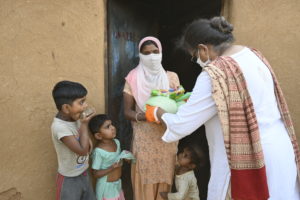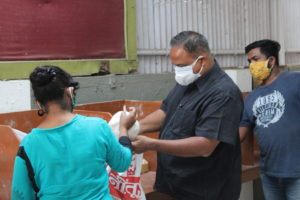PM Cares Fund cannibalises NGO funding

Even though NGOs like Aarohan in New Delhi are facing severe fund crunch, they have stepped up their activities during the pandemic
India’s vibrant civil society landscape risks devastation as the coronavirus pandemic and a severe funding crisis grips NGOs across the nation.
March is a month that almost all non-governmental organisations (NGOs) all over India eagerly look forward to. For, this is the month when their biggest donors, mainly large companies, decide on their social funding budgets and priorities for the fiscal year that begins on April 1.
March 2020 began on a familiar note as most NGOs rushed to submit their proposals with the hope of locking in adequate resources to carry on their work. However, by mid-March, as the coronavirus pandemic began spreading across the country and the government began taking strict measures in order to curb the spread of the pandemic, the NGOs began to get the first signals of danger that the future could hold for them as several restrictions on ordinary life began to kick in and affected work.
Towards the end of March with the lockdown in place, most NGOs realised that the next fiscal would be anything but easy. Their first challenge was to ensure that all their volunteers and paid staff could report to work and the resources needed for their work was made available to them. Secondly, the NGOs had to make sure that none of their activities dealing with the vulnerable section got affected. In fact, many of them felt the need to step up their activities in view of the pandemic as the most vulnerable sections of the society had also been hit the hardest by the lockdown and the subsequent economic hardships.
But as the pandemic spread, companies began to be impacted not just due to their factories or offices shutting down, but also due to the dramatically slowing down economy which threatened not just their profits but also revenues and hit their capacity as well as desire to donate.
However, the launch of PM Cares Fund, a special fund created for tackling Covid-19, has turned out to be the biggest challenge for the NGOs. The NGOs feel that they are at a severe disadvantage compared to the PM’s Fund on two major counts. One is that few business leaders, however socially-committed they might be, would be able to ignore a fund launched by the prime minister himself and the one to which he has been asking the entire country to donate to. The second reason is that while donations to NGOs enable companies to claim only 30 pc tax deduction, all donations to the PM Cares Fund come with 100 pc tax deduction.
“Last year in March we had received a total sum of INR 25 million. For that we start working on it from December itself like sending proposal and we receive the money in March end. This time we could only arrange just INR 4.5 million. This is a huge fall. Most of the donations this time went to PM CaresFund or projects that are working for Covid-19,” says Girish Kulkarni, founder, Snehalaya, an NGO that mainly works for HIV+ sex workers and their kids.
Kulkarni outlines the reasons clearly. ‘‘The reason behind this is that organisations like ours don’t have the provision of giving 100 pc tax exemptions whereas the PM Cares Fund or several other government funds offer 100 pc tax exemption to the tax payer whether they are companies or individual tax payers. Unfortunately, NGOs like ours are not allowed to offer the same facility to the donors. Now the government is asking the NGOs to come forward and help the people in need. How are we supposed to do that? For us to help the people, the government has make donations to NGOs also entirely tax free, only then the organisations can help.”
Though in his address to the nation in March, Prime Minister Narendra Modi had appealed to help the poor and needy especially by providing food and protective gear such as face masks, it was the PM Cares Fund that handicapped the NGOs doing this work. To remain in the good books of the government officials, big corporate houses contributed fat cheques to the PM Cares Fund. Their task was perhaps made easier as the government also ruled that all corporate donations to the fund would be considered as part of the Corporate Social Responsibility contribution, under which all profitable companies are obliged to spend 2 pc of their net profit on social welfare.
Moreover, many companies gave money to the PM’s fund even at the cost of their own employees. According to reports, Cure.fit, a health, fitness and food start-up laid off around 1000 employees and reserved INR 20 million as an emergency fund but donated INR 50 million to the PM Cares Fund. Similarly, Reliance that generously donated INR 5 billion to the PM Cares Fund even as it announced salary cuts for employees. Apparently, for some companies robbing Peter to pay Paul does not pose a moral dilemma.
While Snehalaya is still trying to cope with the situation, there are several other NGOs in India that have been brutally hit by the lockdown. From very few volunteers to low financial aid, the struggle of the NGOs is only escalating.
“Aarohan is completely smashed after the lockdown. Earlier we were working with 36 employees but after the lockdown we are working with just six. I am not sure how we can survive in this condition,’’ says Rani Patel, founder president of the Delhi based NGO that works with children from slum areas.
“I don’t think the situation is going to improve for NGOs and after this PM Cares fund people are likely to donate only to that. There is also a lot of change in the grants system, now they have added new clause for the NGOs to receive donation,’’ Patel adds.
Though most NGOs have been hit by the pandemic, those working in the medical domain have benefitted as all the current focus of the government as well as donors, large or small, is on the issue and the NGOs that work in the domain of health are at the core of funding grants that are being disbursed currently.
Doctors For You (DFY) is one such beneficiary. An NGO that brings together doctors, nurses and other healthcare professionals, DFY has been active in several states of the country, working with issues like malnutrition, HIV and infectious diseases. The NGO has been overwhelmed with work in Mumbai, its headquarter, as the metropolis has been hit hard by the pandemic. But its funding has not been impacted. “Covid being a medical disaster, our funding has not been impacted that much. In the past 20-25 days, we have already received about INR 27 million from major donors like Wipro and HCL. But I do agree that for NGOs that are not involved in healthcare, things would be very difficult as now everything seems to be revolving around Covid only,’’ says Dr Vaishali Venu, president of DFY.
Indeed, some believe the Covid pandemic is being exploited by some companies that see a massive branding opportunity and do not shy away from making donations, but with a lot of publicity and with the objective of being in the good books of the government and the powers that be. “For some organisations this is a good branding time. But it’s actually not helping those who are in need. All the corporate work heartlessly. Everything is just a branding opportunity for them. Working with NGOs, on the other hand, needs commitment and is a emotional work,” says Aarohan’s Patel.
Down though they may be, but out the NGOs certainly aren’t, be it Snehalaya or Aarohan and both are committed to continuing their work with the same degree of commitment. “We have to reboot ourselves and find out how we can sustain ourselves,” adds Patel.










